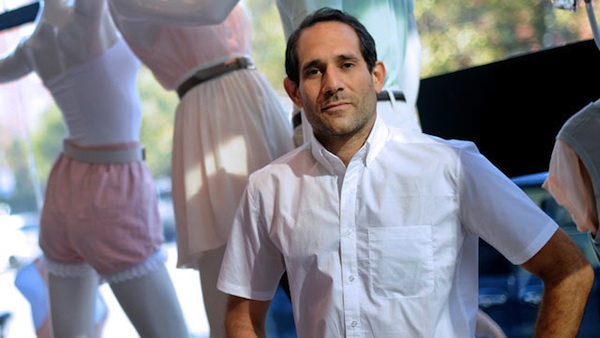Dov Charney is the CEO of American Apparel and, for what it’s worth, he once masturbated in front of a reporter. (Just thought we’d get that out of the way quickly.) Right now, American Apparel’s stock is trading under $1, so suffice it to say, it’s not doing that well. The company has attracted attention because it has a ‘Made in the USA’ campaign, which is always interesting — the labor costs are thus higher, but are you getting more customers who believe in the good ol’ U-S-of-A? There’s been a bunch of studies about that. The thing with Charney is, though — he doesn’t actually believe in “Made in America” as an idea. He believes it’s a business necessity because of the way the world is shifting:
”What we’re trying to do is build a business that’s very futuristic in the sense that we don’t want to rely on these labor inequalities that are not going to be sustainable forever anyway.”
There are flaws to his thinking, but the one aspect that is true is this: cheap labor is completely a moving target. It shifts pretty much every five years, in all honesty. Consider this, from Quartz:
You can see his point in Asia’s history as an export market. While Bangladesh and its troubled working conditions are the current poster-child for cheap clothing, in the 1950s and 1960s retailers bought cheap goods from Japan, and then from Hong Kong, Taiwan and South Korea, and after that, in the 1990s and 2000s, from mainland China and southeast Asia. Cheap labor costs are a moving target: Trade increases investment, investment creates prosperity, and prosperity raises wages.You can now see this happening within China itself, where industrialization is spreading inland as wages have risen on the coast.
So the basic idea here with Charney is that the idea of cheap labor isn’t sustainable for one of two reasons. Either investment — > prosperity —- > higher wages, or investment — > prosperity —- > no increase in wages — > violent uprising. In either case, producing in the U.S. is a safer, more stable investment, or so goes the logic.
Problem is, their stock price is so busted that all their competitors would need to see one of the above situations happen really quickly, and the tides of mass-producing-clothes-or-consumer-products don’t shift that quickly.
In positive news, though, American Apparel had a kick-ass Sochi marketing campaign.

Very descriptive article, I loved that a lot. Will there be a
part 2?